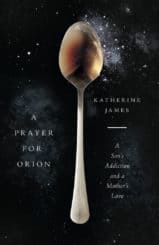
The opening to Katherine James’s memoir, A Prayer for Orion, is enough to leave a reader—and in particular, a reader who is also a parent—breathless. One July morning, James finds a text on her teenaged son’s phone, suggesting his purchase of heroin is imminent. Confronted, the son (named Sweetboy in James’s book) takes off, leaving his phone behind. After hours of Sweetboy being gone, the parents report to the police, whose help is limited. When Sweetboy calls on a friend’s phone at 1 a.m., he is clearly strung out, on something, his language slurred. He doesn’t tell them where he is. His parents fear that his life is in jeopardy, and worry that he might die.
Thus begins James’s book, limning the contours of many parents’ worst nightmares. Except for James and her husband, Rick, this nightmare—and the horrible aftermath of Sweetboy’s overdose—is all too real, a catastrophic event that James describes in prose that is ironically beautiful in the horrors it describes. Perhaps it is because of this beauty, because of the horror, because of the sadness and hope and the deep, abiding faith James expresses: perhaps because of all this, A Prayer for Orion is a powerful, life-changing book that should be required reading for every parent, not just those facing the challenges of raising sons and daughters who are addicted to substances like heroin.
Perhaps because of this beauty, because of the horror, because of the sadness and hope and the deep, abiding faith James expresses: perhaps because of all this, A Prayer for Orion is a powerful, life-changing book that should be required reading for every parent, not just those facing the challenges of raising sons and daughters who are addicted to substances like heroin.
After the memoir’s stunning beginning, James moves back through time, narrating her Sweetboy’s relatively calm childhood, growing up in what seems like a relatively calm neighborhood, and with relatively normal siblings (because really, whose siblings are ever fully normal?). Katherine’s husband, Rick James, is a pastor, and both parents are attentive, invested, and wholly present in the lives of their children. And not only their children, but their children’s friends: the James home becomes a meeting place for all kinds of young people, including what James terms “The Lost Boys,” kids who are wayward and lonely, in need of the grounding and discipleship the couple can provide. Their teen daughter and her friends remodel an upper room in their garage, creating something called “The Chill Spot,” where kids can gather, play guitar or video games, visit, and feel like they belong.
The narrative makes clear that Katherine and Rick James have tremendous compassion and grace for the young people who cycle through their home, and that for them, providing hospitality—through meals, space to process difficult experiences, even offering housing—is definitely a ministry. James also makes clear that her son’s addiction is not because of the presence of Lost Boys, and that the causes of addiction are complex and multifaceted, not the result of any one thing.
A Prayer for Orion starts in medias res with Sweetboy’s first overdose, and thus the narrative is not chronological. Instead, James takes readers back and forth through time, from the innocence of Sweetboy’s childhood to the degradation found in Philadelphia’s Badlands, where heroin is readily available and people congregate to live, to use drugs, and sometimes to die. Even in describing the Badlands, though, James’s lens is one of compassion for those caught in an evil web of addiction; this compassion is realistically tempered with the intense desire to keep her own child, her Sweetboy, from reaching the Badlands and its inhabitants, to purchase his next hit.
James does not spare readers the painful details of substance abuse, and of the ways a child’s addiction can gut his parents, again and again. This unalloyed narration of addiction might be problematic, might make readers fearful and anxious about those who use drugs; but James’s willingness to lay bare the grief her family has experienced is a significant strength in A Prayer for Orion. She reminds us that even the best parents, with the best intentions and a deep faith in God, can face the challenges and the despair she has faced. No one is immune from suffering. And also, no one is beyond reach of God’s comfort and love, even The Lost Boys or those who are addicted and strung out in the Badlands.
Still, James wonders what she might have done differently to spare her Sweetboy the pain of addiction. She finds herself returning often to What If thinking: what if they could go back through time, and Sweetboy could make different choices, about weed or cigarettes; what if he’d gone to church camp and stayed friends with his boyhood companions; what if he’d eaten more fruits and vegetables; what if the circumstances of his birth had been different? James notes that what if thinking is tempting for those parents caught in the tumult of raising a child struggling with addiction, reflective of the loss of control parents feel, the desire to figure out why a child finds his way to heroin or alcohol or any other kind of life-altering addiction.
“What if” thinking is tempting for those parents caught in the tumult of raising a child struggling with addiction, reflective of the loss of control parents feel, the desire to figure out why a child finds his way to heroin or alcohol or any other kind of life-altering addiction.
Powerfully, James has an epiphany that takes her from what if to even if. Although she has little control over what happens with her son, she realizes that, no matter what, “everything would be okay.” James writes that “even if I lost my son and experienced unimaginable pain I knew it would bring, my God is a good God and a loving God and someday, as it says in the book of Revelation, he will wipe away every tear from my eyes.” As James’s narrative moves from the what if to the even if, from the evil of drug addiction to the light that comes when someone finds healing, she provides a kind of hopeful affirmation we all need, whether we are navigating life with a loved one struggling with addiction, or not.
The title of A Prayer for Orion alludes to a moment in James’s story, when her family has moved into a new house, sight unseen, a house with “totemic power” and a huge bay window. The move is disruptive for the family, but also perhaps providential, and at some point, James begins looking out the window into the night sky, praying for her kids. In many ways, her memoir itself is also a prayer, a supplication to the God who journeys with us, no matter the pain we bear; and in whose likeness we are created, all of us, even The Lost Boys and those dealing drugs in the Badlands.
 Melanie Springer Mock is a Professor of English at George Fox University, Newberg, Oregon. She is also the author or co-author of five books including, most recently, Worthy: Finding Yourself in a World Expecting Someone Else (Herald Press, 2018). Her essays and reviews have appeared in The Nation, Christianity Today, The Chronicle of Higher Education, and Mennonite World Review, among other places.
Melanie Springer Mock is a Professor of English at George Fox University, Newberg, Oregon. She is also the author or co-author of five books including, most recently, Worthy: Finding Yourself in a World Expecting Someone Else (Herald Press, 2018). Her essays and reviews have appeared in The Nation, Christianity Today, The Chronicle of Higher Education, and Mennonite World Review, among other places.

